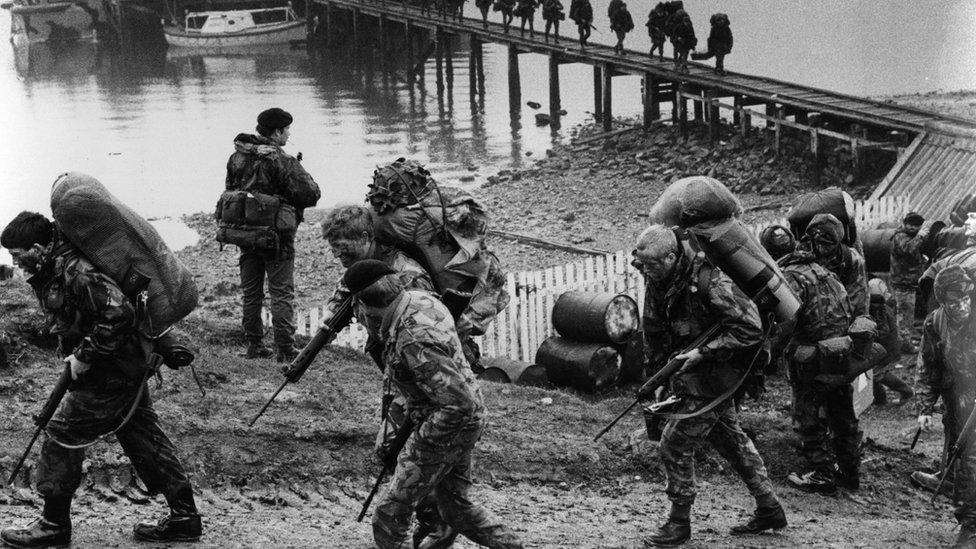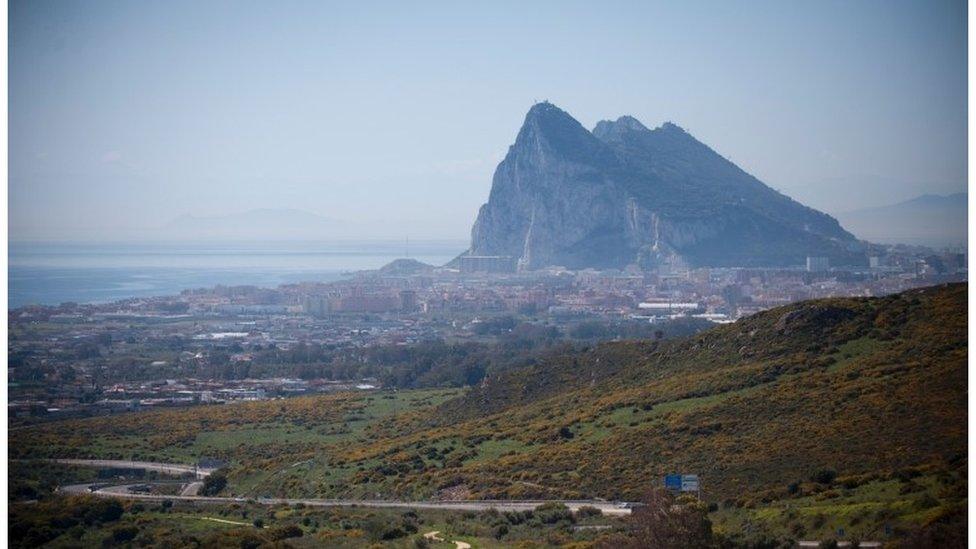Brexit: Lord Howard accused of 'sabre-rattling' over Gibraltar
- Published
Howard: Show Falklands resolve over Gibraltar
A senior Tory has been criticised for saying the prime minister would defend Gibraltar in the same way as Margaret Thatcher defended the Falklands.
Lord Howard told the BBC Theresa May would show the same "resolve" as Mrs Thatcher did over the 1982 conflict.
The Lib Dems said he was "sabre-rattling" and Labour also criticised the "inflammatory" remarks.
Mrs May said the UK was "steadfastly committed" to Gibraltar, after the EU raised it ahead of Brexit talks.
In its draft negotiating guidelines, published last week, the EU said decisions affecting Gibraltar - a British territory - would be run past the Spanish government.
Speaking on BBC One's Sunday Politics, Lord Howard said that 35 years ago, "another woman prime minister sent a taskforce halfway across the world to protect another small group of British people against another Spanish-speaking country.
"And I'm absolutely clear that our current woman prime minister will show the same resolve in relation to Gibraltar as her predecessor did."
'Ludicrous'
After Argentina invaded the Falklands in 1982, Margaret Thatcher sent a task force to reclaim the islands, in the South Atlantic, and an estimated 655 Argentine and 255 British servicemen lost their lives in the fighting that followed.
Labour's shadow foreign secretary Emily Thornberry said: "Inflammatory comments like those by Michael Howard will not help Britain get what it needs from these difficult Brexit negotiations."
Lib Dem leader Tim Farron added: "In only a few days the Conservative right are turning long-term allies into potential enemies.
"I hope this isn't a sign of the government's approach to the long negotiations to come.
"Brexiteers have gone from cheering to sabre-rattling for war in four days, it is absolutely ludicrous."

Margaret Thatcher sent a taskforce to reclaim the Falklands Islands after they were invaded by Argentina
The EU's guidelines followed a letter from Mrs May formally triggering Brexit talks, which did not mention Gibraltar directly.
Speaking on the BBC's Andrew Marr Show, Defence Secretary Sir Michael Fallon said the UK would protect Gibraltar "all the way" because its residents had "made it very clear they do not want to live under Spanish rule".
He defended the lack of mention for Gibraltar in the letter invoking Article 50 of the Lisbon Treaty, saying it had referred to a separate document in which Gibraltar was included.
Gibraltar, which voted overwhelmingly for Remain in June's referendum, asked the British government on more than one occasion to include a reference in the Article 50 letter, a source in the Gibraltarian government told the BBC.

Gibraltar: key facts

Gibraltarians are British citizens but they run their own affairs under a chief minister
The territory is self-governing in all matters - including taxation - except foreign policy and defence, which are dealt with by the UK government
Despite its small size, Gibraltar is strategically important, standing only 12 miles from the north coast of Africa. It has a UK military base, including a port and airstrip

After Mrs May spoke to Gibraltar's chief minister Fabian Picardo on Sunday, Downing Street said: "The prime minister said we will never enter into arrangements under which the people of Gibraltar would pass under the sovereignty of another state against their freely and democratically expressed wishes, nor will we ever enter into a process of sovereignty negotiations with which Gibraltar is not content.
"The prime minister said we remain absolutely dedicated to working with Gibraltar for the best possible outcome on Brexit and will continue to involve them fully in the process."
Mr Picardo said he was "energetically and enthusiastically" supporting Mrs May in her Brexit negotiations.
During his Marr Show interview, Mr Fallon also defended the UK government's reference to security co-operation in its Brexit letter.
'Special partnership'
The government has said the line that fighting terrorism would be "weakened" if a deal was not agreed was a statement of facts, not a threat to the EU ahead of talks beginning.
In response, EU leaders said there could be no attempt to "bargain" between trade and security.
Sir Michael said: "It's very important to link trade and security because what we are now looking for is a deep and special partnership that covers both economic and security co-operation.
He said he was "absolutely" proud of that link, adding: "It's very important that we go on committing to the security of the continent."
Asked if failure to secure a deal would make the EU less secure, he said: "We would all be worse off it there wasn't a deal. We are expecting to have a deal."
Labour's shadow foreign secretary Emily Thornberry told the BBC's Pienaar's Politics the government was "clearly" using the UK's military strength as a "bargaining chip".